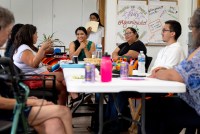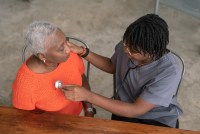Latest KFF Health News Stories
Médicos son reacios a preguntar el estatus migratorio de pacientes, a pesar de nueva ley de Florida
Médicos, enfermeras y expertos en política sanitaria afirman que la ley ataca a personas marginadas que ya tienen dificultades para navegar el sistema de salud y que les disuadirá aún más de buscar ayuda médica.
Doctors Hesitate to Ask About Patients’ Immigration Status Despite New Florida Law
Florida’s new immigration law requires hospitals to ask patients about their immigration status at admission and in emergency rooms, and report that information plus the cost of care for residents without legal status. Doctors and nurses who oppose the policy seem reluctant to criticize lawmakers for fear of political retribution.
Community With High Medical Debt Questions Its Hospitals’ Charity Spending
Pueblo, Colorado, residents have higher-than-average medical debt, while the city’s two tax-exempt hospitals provide relatively low levels of charity care.
Journalists Explore Shortage of Foster Care Sites and Prevalence of Covid Misinformation
KFF Health News and California Healthline staff made the rounds on national and local media this week to discuss their stories. Here’s a collection of their appearances.
Doctors Created a Primary Care Clinic as Their Former Hospital Struggled
With the community’s help, former co-workers came together to fill gaps in care left by the loss of doctors and departments at a Gallup, New Mexico, hospital.
Idaho Drops Panel Investigating Pregnancy-Related Deaths as US Maternal Mortality Surges
Amid a years-long rise in maternal mortality rates in the United States, Idaho lawmakers decided to disband a committee created to investigate pregnancy-related deaths.
New Charleston Museum Nods to Historical Roots of US Health Disparities
The $120 million International African American Museum that opened this week in Charleston, South Carolina, allows visitors to step back in history at Gadsden’s Wharf, where tens of thousands of enslaved Africans arrived in America, the genesis of generations of health disparities.
Escasez crónica de salvavidas resalta desigualdades raciales
Cuando las autoridades locales toman decisiones sobre el cierre de piscinas o la reducción de horarios, lo hacen sabiendo que la natación tiene un tenso historial de desigualdades raciales.
Chronic Lifeguard Shortage Serves as Springboard to Address Racial Inequities
Cities and towns are again in deep waters this summer trying to hire enough lifeguards to open their public pools. Many are proceeding with sensitivity to issues of race and ethnicity.
Cardiovascular Disease Is Primed to Kill More Older Adults, Especially Blacks and Hispanics
Cardiovascular disease is the biggest killer of older Americans, with Black and Hispanic people at higher risk. Despite medical advances, researchers say, disparities are expected to worsen in the coming decades.
La enfermedad cardiovascular podría matar a más adultos mayores hispanos
El dramático envejecimiento de la población de Estados Unidos y el número creciente de personas con afecciones como hipertensión, diabetes y obesidad —que aumentan el riesgo cardíaco— se espera que contribuyan a este escenario alarmante.
Study Reveals Staggering Toll of Being Black in America: 1.6M Excess Deaths Over 22 Years
The profound and painful loss — 80 million years of life, compared with the white population — is a call to action to improve the health of Black Americans, especially infants, mothers, and seniors, researchers say.
‘A System in Crisis’: Dysfunctional Federal Disability Programs Force the Poor to Pass Up Money
With little or no income, disability applicants are seeking Social Security early retirement benefits even though it could cost them tens of thousands of dollars in future income, lawyers say.
Students in Rural Colorado Are Left Without Options as Specialized Schools Close
A new state law aims to keep the doors open at schools that accept students with intensive needs. One preteen in rural Colorado shows how the current system leaves some students bouncing between institutions far from home.
El trabajo en Chicago, Philadelphia, Los Ángeles y Nueva York halló que los niños negros no hispanos tenían 100 veces más probabilidades que los blancos no hispanos de ser víctimas de tiroteos mortales y no mortales.
Gun Assault Rates Doubled for Children in 4 Major Cities During the Pandemic, New Data Shows
A study of roughly 2,700 shootings in Chicago, Los Angeles, New York, and Philadelphia found that racial disparities in gun injuries and deaths widened during the covid-19 pandemic. Researchers looked only at assaults, excluding accidents or incidents of self-harm.
The Nation’s Health Secretary Has This Doctor on Call
Carolina Reyes, a physician who specializes in high-risk pregnancies, says providers and health systems have a role in tackling systemic racism. She’s also married to U.S. Health and Human Services Secretary Xavier Becerra.
High Inflation and Housing Costs Force Many Americans to Delay Needed Care
A recent Gallup Poll suggests that Americans are putting off medical care because of costs. Inflation and rising rents make it harder for people to make ends meet.
Truly Random Drug Testing: ADHD Patients Face Uneven Urine Screens and, Sometimes, Stigma
Doctors have no national standards on when to order urine tests to check whether adult ADHD patients are properly taking their prescription stimulants. Some patients are subjected to much more frequent testing than others.
Journalists Delve Into Insulin Costs and Prior Authorization Policy
KHN and California Healthline staff made the rounds on national and local media this week to discuss their stories. Here’s a collection of their appearances.






















